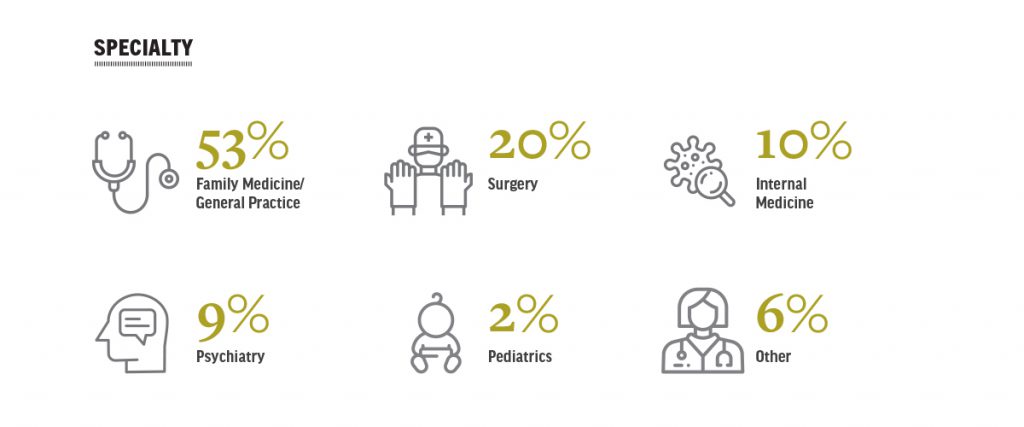
Our series on complaints data looks at how medical record-keeping can fall short
The third installment in our Complaint Data series: Medical Records Keeping
What type of complaints does the College receive about physicians? Are certain specialties more likely to receive a particular complaint? In this series, we take a closer look at our recent data to provide you with a window into the type of issues that come before the College’s Inquiries, Complaints and Reports Committee.
Good medical records — whether electronic or handwritten — are essential for the continuity of care of your patients. They provide the basis for current investigations and treatments and allow subsequent health-care providers to understand the patient’s medical condition. They also provide other health-care professionals in the patient’s circle of care with a clear picture of the patient’s health.
But many of the physicians who receive a College complaint are found, in the course of the investigation, to not have appropriate documentation in their medical records.
In the third installment of a series that takes a deeper look at our complaints data, we focus on the issue of medical record-keeping.
This analysis reviewed closed investigation files related to medical record keeping concerns with a decision issued between January 2013 and May 2020. In order to be included in the review, the files had to identify an issue with medical record keeping that was addressed by the Inquiries, Complaints, and Reports Committee (ICRC).
The review consisted of 3,607 files involving 2,813 physicians. Eighty-three percent (N=2,321) of the doctors named in the files received one complaint related to their medical record keeping, and 17% (492/2,813) received two or more during the period of review.
In the investigations where the ICRC took some form of action, 98% (2,633/2,700) were directly related to medical record keeping issues. Complaints raised about medical record keeping included improper use of abbreviations, illegible records, incorrect documentation, and inadequate or incomplete documentation. The latter is the most prevalent concern among medical-record keeping issues.
“You learn about good medical record keeping in medical school, then it is emphasized in residency, but some physicians don’t seem to prioritize the importance of legible and complete records,” said Dr. Anil Chopra, chair of the ICRC and a Toronto emergency medicine physician. “It is understood that physicians may be time constrained with competing priorities, but they are still expected to find the time to legibly document complete and accurate notes,” he said.
“Your notes,” said Dr. Angela Carol, a CPSO medical advisor and a Hamilton family physician, “should provide the reader with enough clinical detail about the presenting problems, assessment, examination, diagnosis, treatment and follow up plans in order to tell the story,” she said.
Dr. Carol sat on the working group that developed the recently approved Medical Records Documentation policy. The policy requires all primary care physicians to include an up-to-date Cumulative Patient Profile, or an equivalent health summary, that includes critical elements of the patient’s medical history and allows the treating physician and other health-care professionals using the medical record to quickly get a picture of the patient’s overall health.
Providing other health-care professionals with a complete picture of the patient’s health will benefit the patient through less time lost on repeating tests and by averting inaccurate diagnoses or the prescription of inappropriate treatments, said Dr. Carol.
And if a patient concern or poor outcome arises, contemporaneous and comprehensive documentation is a physician’s best protection against civil liability or an adverse outcome from a CPSO review, said Dr. Chopra. “Your notes will provide insight into the clinical judgment that you exercised during the clinical encounter. Any objective review of records will assume that if you didn’t write it down, it did not occur,” he said.
Advice from ICRC
- Document your findings during the patient visit or as soon as possible afterwards. Nobody’s memory is infallible.
- Never alter records after the fact. Corrections and additions should be signed or initialled or in the case of EMRs, time-stamped, and added as an addendum.
- Don’t use demeaning language. “The physician should always consider what the patient would think about the documentation if they were to read the records,” said Dr. Chopra.
- Use templates and other auto features carefully. The documentation should be a true reflection of the assessment.
- Respond in a timely way when patients – or their representatives – ask for copies of their medical record.



Read other articles in our complaints data series.
Complaints related to medical records by gender.
This graphic provides the gender of physicians receiving a medical records complaint. Of the 2,813 physicians, 75% were male and 25% were female.












